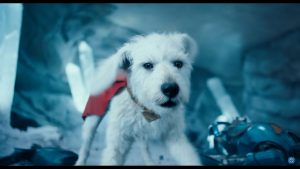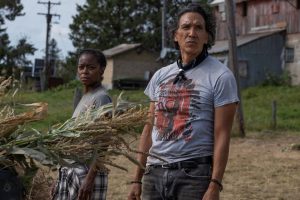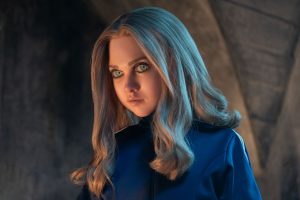Reviews include Superman, Apocalypse in the Tropics, and To a Land Unknown.
Any Other Way Celebrates Jackie Shane’s Courage to Be Authentic
February 20, 2025

There’s an aching sadness when filmmakers Michael Mabbott and Lucah Rosenberg-Lee speak about the late Jackie Shane. The way they talk about the legendary trans Black singer makes it clear how much they adored her. Shane’s impact is not lost on them.
Any Other Way: The Jackie Shane Story looks at why the 1960s R&B singer disappeared from the spotlight despite being at the precipice of fame and success. Through phone conversations and rotoscope animation interpretations Mabbott and Rosenberg-Lee reconstruct the life of Jackie Shane and her mark on music.
Mabbott started working on this documentary eight years ago when he discovered Jackie’s music. He was curious about her work and why very little is known about her even though she had a relatively successful presence in the music scene. When he contacted Jackie about making a film about her story, he spoke with her for hours about her life, her experiences, and her music. Even while he converses with me, he remembers those days with a twinge of joy and sadness. For Rosenberg-Lee, learning about her experience and how she navigated it gave him strength on a personal level.
I spoke with the two about bringing this documentary to life – it was one of Canada’s Top Ten films of 2024 and is nominated for the TFCA’s Rogers Best Canadian Documentary award alongside Yintah and Your Tomorrow.
How does it feel to be among the nominees for the Rogers Best Canadian Documentary at the TFCAs and be among the TIFF Canada’s Top Ten?
Michael: God, it feels it feels great. I guess because it’s our Toronto peers and Toronto was such a big part of Jackie’s life. It feels really wonderful that she’s getting the stage and the spotlight again, and that we think she deserved to have [it] this entire time, but for many reasons didn’t, so it feels really wonderful as filmmakers. But in terms of Jackie specifically in the recognition from our Toronto peers, it means a lot.
Lucah: Feels great and I second everything Michael said. I know Jackie would be absolutely thrilled and it’s a great place to end the festival season that we had. I’m very happy.

This doc beautifully reclaims her forgotten legacy. What was it about Jackie that you felt needed to be captured in this doc?
Michael: I started this project eight years ago and at that time we were saying, “Now is the time for this story to be told.” That urgency to tell that story and the need to tell this story has only increased, unfortunately, year after year. It is, I hope, the most acute time now. Culturally it’s been really, really important. My hometown is Toronto and most of my films have been music-based films and when I heard Jackie’s album 12 years ago, it blew my mind because of her musicality and her joy and her message, but it also blew my mind because I hadn’t heard of Jackie. I didn’t know that music was being made at this level in Toronto. When I looked around to find out anything about this extraordinary musician who was obviously a huge presence in Toronto when she was here, there was very little about her, so at the outset I was incredibly curious. I wanted to know more, but also wanted to share this story. When we couldn’t find much information and realized how much erasure had happened, it seemed important to do her justice and to give her the spotlight that she deserved.
Lucah: I’d say obviously the music and her stage presence for Michael and I, that was one of the more challenging things about the film: how do we bring her to life only using her voice and when so many people who did see her on stage are no longer with us or were challenging to find? How do we bring that energy to the film? For me, it’s been amazing that people have left the film feeling like, ‘Wow, what an incredible artist, what an incredible person, what an incredible performer.’ It was really important that we brought that to the screen.
When you spoke for hours on the phone with her – what did you find was the key to understanding her legacy?
Michael: That’s a big question. Originally, one of my questions was how did she become the artist that she was? How did she become the human being that she was? Where did she get her strength? Where did she get her virtuosity? Some of that was informative. She had an incredible mother who was actually her aunt, who raised her and gave her a lot of strength and power and self-confidence. Jackie was also just a remarkable human being. .She was able to connect to others in a way that not a lot of people can. I was earnestly trying to find out how could this rationally happen that such a person could become who she was. We found out some of those answers, but she was a remarkably connected person – connected to herself, connected to something bigger than herself, and able to connect to others. And, of course, her bravery – the courage to stand up on stage and just be yourself.
I see Jackie being so true to who she is that whoever they are, whatever their background is, whatever fears they’re trying to overcome, [people] can look at Jackie on stage or hear her music and say, ‘I want to do that, I can do that.’ She gave people that courage and that understanding. I think that was her legacy, for me.

When she agreed to have this doc about her, did she share what she wanted the world to know about her life and struggles?
Michael: It wasn’t so much as now, that the world is finally ready to hear her story and can accept her story. It was now the world needs this story. She was always so concerned with young trans and queer performers and young people in general. She escaped the Jim Crow South and eventually returned to the South under Donald Trump and she was looking around saying how much has changed. [Shane was born in Nashville and returned there, where she lived until her death in 2019.] I think she wanted this film to be made and wanted her story to be told to give strength and courage to other people that were going through similar things and just people in general. She really believed and she talked a lot about this, for all of the hatred and evil that she experienced in her life that she didn’t feel that was rooted in hatred—she felt it was rooted in fear; people being scared. I think that’s what she wanted to be told. She was a living example. She didn’t have to preach to people or tell people how to live. She just lived the way she lived and encouraged people to do the exact same.
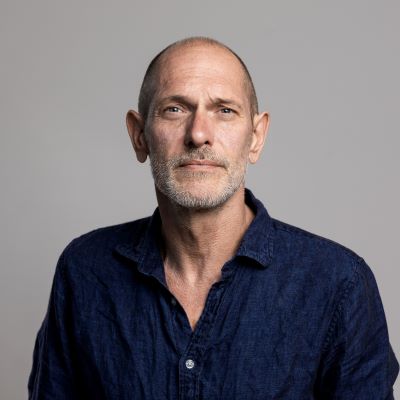
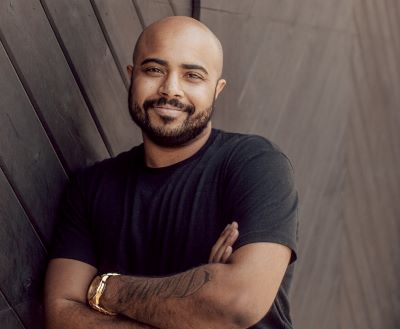
Lucah: Michael was the one who chatted mostly with her, in terms of what she wanted. But I completely agree with all of that stuff. As a Black trans person, she’s very inspiring to me. It’s been amazing to learn about her life—through the tapes, through her writing, through her photos. We all need a role model like Jackie in terms of what it means to be yourself and be unapologetic and what it means to get through really difficult times. We all have a lot of ups and downs, and I think trans people have very specific ups and downs as well, so to learn more about her experience and how she navigated that has given me strength on a personal level.
I loved the storytelling device used from the audio interview and animation to acting it out – it’s beautifully coded. What was your process for bringing Jackie’s story to life, considering the lack of archival or recorded material?
Michael: I’ve been obsessed with rotoscope animation for like 20 years…I’ve been thinking about what rotoscope animation could do in terms of interacting with archive audio. Even when Jackie was alive, I knew that there was only one piece of live footage of her and yet there was all of this extraordinary live audio. People talked about seeing Jackie perform, about these electric performances, these intimate performances. I pitched the idea of roto to Jackie when we were talking about this film and she was into it. It seemed like a good solution because of everything that you can do to make these intimate and electric performances come to life. Of course, when she passed away, and I had all of these hours of our conversations. It was just an organic extension to use the roto for that and we were delighted with what we were able to do In terms of Jackie’s voice and Jackie’s music. But the other layer to it was working with the two actors that brought Jackie to life: Makayla Walker [aka drag performer Makayla Couture] and Sandra Caldwell, who are both Black trans performers. Their job on this was to inhabit Jackie’s words and Jackie’s voice and the power that they brought to that was extraordinary. But then we were also talking to them as interview subjects, and both women would be incredible people to hear their perspectives.
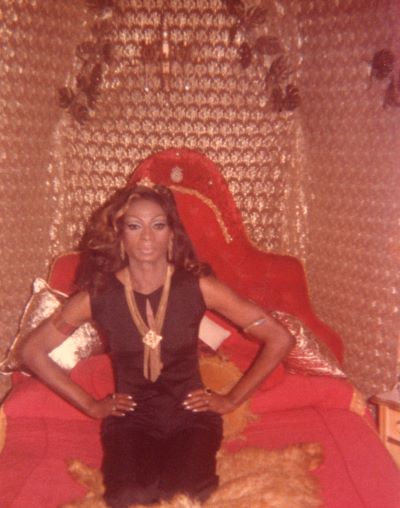
Was Jackie ever going to do a sit down interview before like a face-to-face conversation for the doc?
Michael: Oh, that was absolutely the plan. When she finally, after a year and a bit, agreed to do this, that was definitely the plan to go down to Nashville. She was always teasing all of the things that she had kept, which we did find, obviously, after the fact. I miss her every day and I dreamed of being able to meet one of my idols and shake her hand or get a hug. But, in retrospect, she passed away, which was heartbreaking, but that led to many things. One working with Lucah, which was absolutely extraordinary creatively, intellectually, emotionally, but it also meant that what we had of Jackie’s voice was the conversations that she and I were having and they weren’t straight up question and answer conversations, like we would have had in a traditional documentary interview. She was a 77-year-old woman. We would have shot for four hours a day [if doing conventional interviews] and so, instead, they were two friends talking and when I said two friends talking, I mean, one talking, one listening 99% of the time. I think there was an intimacy to the audio and to our conversations that we might not have been able to get.
Lucah: On top of that, if Jackie had lived and done that interview and said [everything], we may not have even had Andrenee [Majors Douglas] and Vonnie [Crawford Moore], the family, because part of the story is them finding out about her death and inheriting everything, which adds another level to it, which wasn’t even in the consciousness when I know Michael and Jackie were talking.

When you look back, what do you think was instrumental in making this doc?
Lucah: For me, I think a lot of time and collaboration and references of what Michael and I liked visually and where we were going to take the story. With something like this, I do think time was a big factor because it did add a lot. Obviously, Michael was working on it for years before I came in around 2020. It’s really letting the story grow and the ideas develop and there’s so much transcript and so much audio… I think that [time] was very instrumental in being able to put a film together that people have responded well to.
Michael: I also think that having Jackie’s voice was huge and having Jackie be able to tell her own story was instrumental to this because of her intelligence and her humour and her wisdom. Jackie kept absolutely everything. She kept all of her stage outfits, many of which she designed herself. She kept jewellery that she designed. So when we unpacked the archive that she left behind, the treasures in there were extraordinarily beautiful. The dream of a documentary filmmaker to go in and find this. There was an unreleased song, which we were able to use in the film, which is just heartbreakingly beautiful. Going through her wardrobe set the tone, the colour palette for the film. Jackie was so tasteful and so elegant. Her hands were on this film and guiding us from everything that she left behind.
Any Other Way: The Jackie Shane Story is streaming on Crave.
The winner for Rogers Best Canadian Documentary will be announced on Feb. 24.

